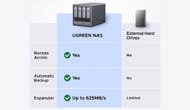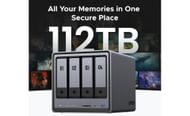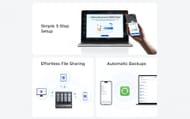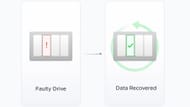When people think of portable storage, they often consider external drives like SSDs. However, you will soon realize it's much less portable than you thought. There's no remote access, data expansion system, data security, and others, all of which are easily solved using a NAS, short for network-attached storage.
A NAS is more than just external storage. It is essentially a centralized storage device, which is attached to your internet router to deliver 24/7 remote access to all your devices. Compared to external storage, NAS devices provide a ton of functionalities that can transform and take your portable data-sharing system to a whole new level.
In this article, we will explain why you should buy a NAS instead of an external drive.
Note: This article contains the personal and subjective opinions of the writer.
List of the best reasons to buy a NAS over an external drive
1) Data sharing with multiple devices

You have to ask yourself why you need an external drive. If it's to transfer large files to other devices, then NAS can do it better. Upload your files and folders to the NAS, and you can then access and copy those data to multiple devices simultaneously.
The same process would take much longer through an external drive since you can only connect the drive to one device at a time. That's why a NAS provides better and faster data-sharing service. Also, you can access and download data from your NAS to any device, whether connected to the same network or not.
2) Central storage system

If your goal with the external drive is to store data from multiple devices, a NAS is a better option. One of the common issues with an external drive is that it is often not recognized by other operating systems.
For example, if you formatted the drive in Windows PC, chances are it is formatted in an NTFS format, which other operating systems like macOS wouldn't recognize. The only solution is to keep multiple external drives for multiple devices, which can become annoying in the long run.
On the other hand, a NAS offers universal access from any device, regardless of the operating system, serving as a central storage system for all your devices.
3) Easy to scale and expand storage
If an external drive runs out of space, your only option is to buy another one and connect it separately, which can be frustrating to manage. In contrast, most NASs have multiple drive bays, so you can add more drives to expand the storage.
4) Better data backup and synchronization

You can install data backup software on your NAS, which can automatically backup data from other devices. In fact, the NAS can backup multiple devices silently without requiring user input. On the other hand, you cannot install backup software on an external drive, so all backups must be done manually, limiting you to one device at a time.
5) Higher data transfer speeds
NAS combines multiple drives, so the data transfer speeds can quadruple, making it a lot faster than a traditional external drive. Even if you buy a really fast external drive, you can still be somewhat limited by the speed of the USB cable.
On the other hand, NAS uses a gigabit ethernet connection, so the final transfer speeds are much higher than external drives.
Also read: How to check the graphics card on Windows 11?
6) Easier collaboration
Since multiple devices from different places can access a NAS, it is easier for people to collaborate and work on a project. You can also assign how much access a collaborator gets and the files the user can use, making it easier to maintain projects.
You cannot effectively collaborate using an external drive since it can only be connected to one device at a time.
7) Higher data security and protection

Data security and protection are two of the best aspects of a NAS. You can set up data encryption and passwords on individual files and folders. Additionally, you can create special/elevated access for some users to ensure others cannot access those files.
Also, in case of drive failure, your data will be completely safe in a NAS since data gets mirrored in other drivers. None of these data security and protection features are available on an external drive.
This concludes all the reasons why a NAS device is a much better choice than an external drive. While you will need to pay more upfront for a NAS device, it will be better in the long term.
Also read: 4TB Samsung SSD drops to the lowest price on Best Buy
